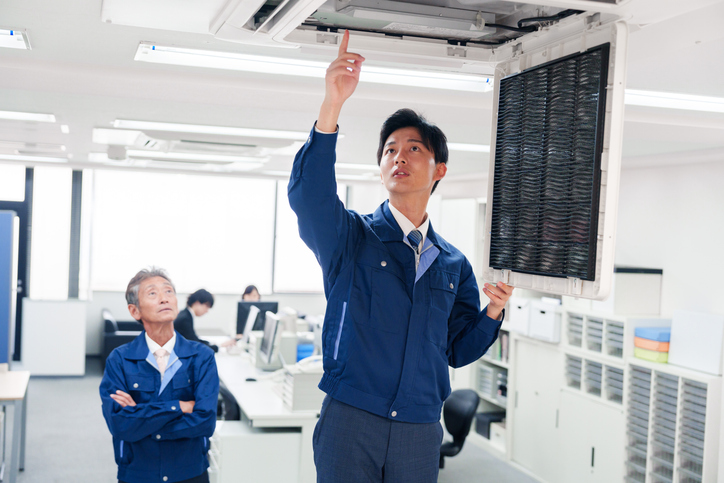ndoor air quality (IAQ) plays a critical role in maintaining a healthy and comfortable living environment. Poor air quality can lead to respiratory problems, allergies, and even long-term health complications. Despite this, many homeowners and business owners overlook the importance of regular air testing. Indoor air quality experts stress the need for routine assessments to detect hidden contaminants, prevent health hazards, and maintain overall air purity. In this article, we will explore the top reasons why professionals recommend frequent air testing and how it can enhance your indoor environment.
1. Detects Hidden Pollutants
Many harmful pollutants are invisible and odorless, making them difficult to detect without proper testing. Common contaminants found in indoor air include:
- Volatile Organic Compounds (VOCs): Emitted from household products such as paints, cleaning supplies, and furniture, VOCs can cause respiratory irritation and long-term health risks.
- Carbon Monoxide (CO): A dangerous gas that can lead to poisoning, headaches, dizziness, and even fatal consequences if left undetected.
- Radon Gas: A naturally occurring radioactive gas that seeps into homes through cracks in the foundation and can cause lung cancer.
Regular air testing identifies these contaminants early, allowing homeowners to take corrective measures before they become hazardous.
2. Prevents Respiratory Issues and Allergies
Poor indoor air quality can trigger allergies, asthma, and other respiratory conditions. Airborne allergens such as dust mites, pet dander, pollen, and mold spores can aggravate symptoms and make indoor spaces uncomfortable. Regular air testing helps to:
- Identify the presence of allergens in the air.
- Determine the severity of contamination.
- Guide necessary steps for air purification and filtration.
By proactively testing the air, individuals can implement solutions like air purifiers, dehumidifiers, and HVAC maintenance to improve air quality and alleviate health issues.
3. Enhances HVAC System Efficiency
Your heating, ventilation, and air conditioning (HVAC) system plays a significant role in regulating indoor air quality. If pollutants accumulate within the system, it can reduce efficiency and circulate contaminated air throughout your home or workplace. Regular air testing helps to:
- Detect airborne debris affecting HVAC performance.
- Identify potential issues like clogged filters or mold growth in ducts.
- Ensure the system operates efficiently for better air circulation.
By addressing air quality concerns, HVAC systems can run more effectively, reducing energy consumption and extending equipment lifespan.
4. Protects Against Mold Growth
Mold thrives in damp conditions, mostly unnoticed until it becomes a major problem. Exposure to mold spores can cause respiratory issues, allergic reactions, and property damage. Regular air testing can:
- Detect mold spores before visible signs appear.
- Identify moisture problems that contribute to mold growth.
- Recommend dehumidification and ventilation improvements to mitigate risks.
By keeping mold levels in check, homeowners can protect both their health and property from costly repairs and remediation efforts.
5. Improves Workplace Productivity
For business owners, ensuring good indoor air quality is essential for employee health and productivity. Poor air quality in office spaces, retail environments, and industrial settings can lead to fatigue, headaches, and decreased focus. Regular air testing can:
- Monitor CO2 levels that affect cognitive function.
- Identify pollutants that contribute to workplace discomfort.
- Support compliance with occupational health and safety standards.
A healthier work environment translates to increased employee satisfaction and overall business efficiency.
6. Prevents Sick Building Syndrome
Sick Building Syndrome (SBS) refers to a condition where occupants experience health issues due to poor indoor air quality. Symptoms include headaches, dizziness, nausea, and irritation of the eyes, nose, and throat. Causes of SBS include inadequate ventilation, chemical contaminants, and biological pollutants. Regular air testing can:
- Pinpoint sources of contamination within a building.
- Assess ventilation effectiveness.
- Provide recommendations for improving indoor air conditions.
By addressing IAQ concerns, property owners can create a healthier indoor space free from SBS-related discomfort.
7. Ensures Compliance with Health and Safety Regulations
Many industries, including healthcare, manufacturing, and hospitality, must adhere to strict indoor air quality regulations. Failure to comply can result in penalties, legal liabilities, and reputational damage. Regular air testing helps businesses:
- Meet regulatory standards for air quality.
- Maintain a safe environment for employees and customers.
- Avoid potential legal issues and health code violations.
Ensuring compliance with air quality regulations protects both business operations and the well-being of those occupying the space.
8. Informs Smart Home Technology Integration
With the rise of smart home technology, homeowners now have access to advanced air quality monitoring devices. However, these devices require accurate baseline assessments to function effectively. Regular professional air testing provides:
- Precise data for smart air quality monitors.
- Insights into necessary adjustments for automated ventilation systems.
- Enhanced integration of air purification solutions.
By combining air testing with smart home automation, homeowners can take proactive measures to maintain cleaner air indoors.
9. Reduces Long-Term Healthcare Costs
Exposure to poor indoor air quality can contribute to chronic health conditions such as asthma, lung disease, and cardiovascular issues. Regular air testing allows for early detection of harmful contaminants, leading to:
- Preventive actions that minimize health risks.
- Reduced medical expenses related to respiratory and allergic conditions.
- Enhanced overall well-being for occupants.
Investing in routine air testing can ultimately save money by preventing health complications linked to poor air quality.
10. Enhances Real Estate Value and Marketability
When selling a home or commercial property, air quality can be a significant factor for potential buyers. A property with excellent indoor air quality is more appealing and can command a higher market price. Regular air testing benefits real estate transactions by:
- Providing documentation of air quality improvements.
- Identifying and addressing issues before listing a property.
- Increasing buyer confidence and marketability.
A well-maintained indoor environment adds value to the property and can expedite the sales process.
Regular indoor air testing is essential for maintaining a healthy, safe, and comfortable living or working space. From detecting hidden pollutants to preventing health risks and enhancing HVAC efficiency, indoor air quality experts provide invaluable insights. Whether for residential or commercial purposes, investing in routine air testing ensures cleaner air, better health, and long-term cost savings.
Breathe cleaner air with Five Star Air! Our indoor air quality experts offer professional air testing to detect hidden pollutants. Call us at 623-244-0414 today for expert solutions to improve your indoor air quality!





